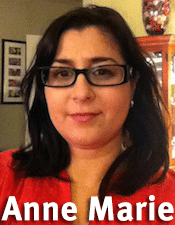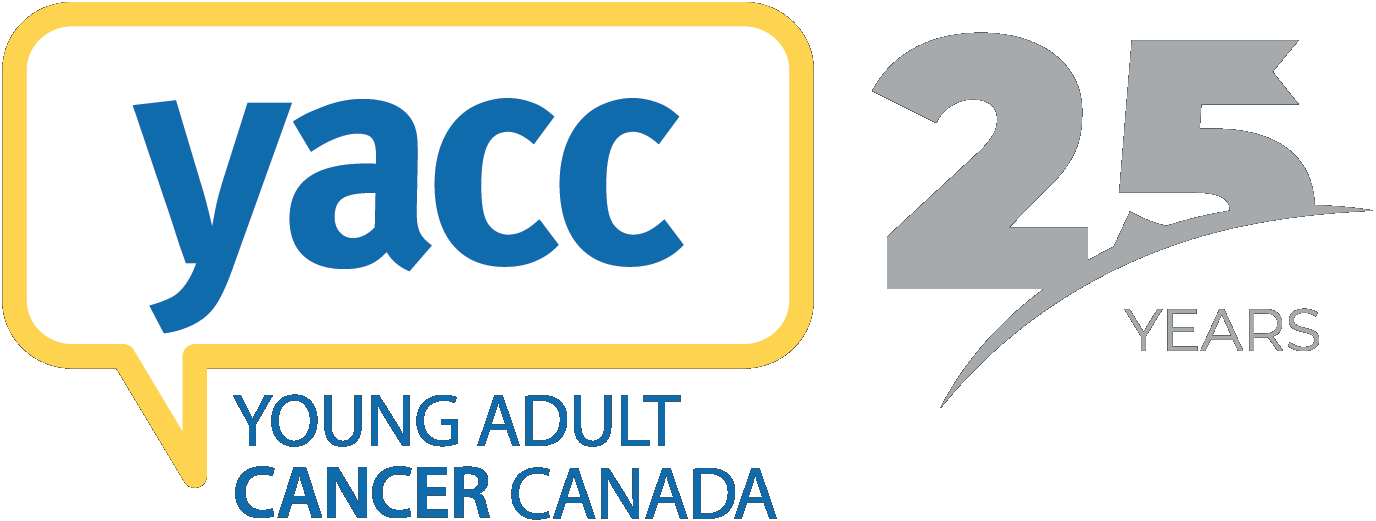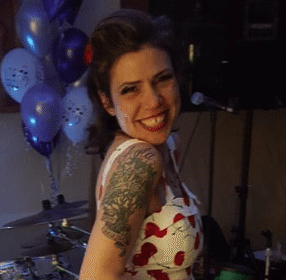
Anne Marie Cerato
Age: 37
City: Toronto, ON
What was/is your diagnosis? Adenocarcinoma of the lung
What year was it? What was your age at the time? 2009 at the age of 30.
What is something you’ve done that you’re really proud of?
Being the first in my family to graduate university.
What is a top item on your life to do list?
Travel and experience all the wonderful things life has to offer.
What are your hobbies?
Painting, photography and jewelry making.
Your diagnosis:
What was your life like before your diagnosis?
My life was pretty full. I had just taken a full time teaching position and was building my career.
How did you find out you were sick? What led to your diagnosis?
I found a small lump on my clavicle and went to see my GP. During the examination he requested an X-ray, which led to a number of other diagnostic tests leading to a biopsy and diagnosis.
What were your first thoughts when diagnosed?
I thought that someone was playing a really bad joke on me, that I was going to die, and that no matter what, I was going to fight like hell.
In which hospitals were you treated?
I have been treated at Sunnybrook in Toronto, Lakeridge Health in Oshawa, and Princess Margaret in Toronto
What did your treatment consist of?
Immediately after diagnosis, I got concurrent chemo and radiation (Cisplatin and Etopicide), surgery to remove the right middle lobe of my lung, then I received high dose Cisplatin and Vinoralbene for two cycles. I had a year cancer free but recurred and began an experimental (now approved) targeted treatment for five years. I am currently waiting to begin another clinical trial for a third generation targeted therapy. For the most part, my symptoms have been well managed. I have experienced the typical side effects such as hair loss, chemo brain, nausea, and vomiting as well as some others such as edema, neuropathy, and degeneration in my joints. The worst side effect and the one that continues to plague me is fatigue.
What is your current medical status?
I have been very fortunate to have had five years NED after my recurrence in 2011. Despite being metastatic, I have been able to enjoy my life. We have just begun to see some changes occurring, so I will be starting another clinical trial soon.
Life after cancer:
How is life different for you now post diagnosis?
I have been doing this dance for a pretty long time now, so I have a different mindset than I did at the beginning. Initially, I was incredibly afraid, I didn’t want my friends and family to watch me die. I felt incredibly alone even with an amazing support system. I hid a lot of my emotions from those who loved me because I didn’t want them to think I was scared. I pretended everything was fine and kept a brave face on, but inside I was terrified. Everything changed, I didn’t recognize who I was anymore after diagnosis. After treatment, I wanted to seize the day and live. All the while, I was terrified that everything was going to fall apart.
About a year and a half after diagnosis, my worst fears came true and I experienced a recurrence. It was another cruel joke. I had just started to put my life back together and had even started working again. In a way, I was relieved because trying to fit into my old life just didn’t feel right, and I realized that my life would never be normal and would always be exceptional. I made a conscious decision to live for myself and do what made me happy. I haven’t looked back and cherish every day.
What was the toughest part about having cancer as a young adult?
The most difficult thing for me was the isolation. It seemed that every time I was at the hospital, I was the youngest person in the waiting room. Having cancer as a young adult is hard, having lung cancer as a young adult is even more difficult because there aren’t very many people who you can turn to for their experience.
What really helped you to keep going while you were sick?
I found naming my tumor (then tumors) and taunting them with threats of cell death was very therapeutic. During radiation, I would visualize the radiation zapping all the cancerous cells. When things got really tough and as I realized I was also dealing with anxiety and depression, counseling, meditation, and medication were and still are very helpful. Music was my lifeline! I never went to an appointment without my tunes.
What keeps you busy during treatment?
During my initial treatment regimen, I was so busy going to and from appointments, it was all I could do. Now that my treatment is life long, it differs greatly. I don’t have to go to the hospital for infusions, I take my meds at home, so I have a great deal more freedom. I now keep busy with advocacy work, volunteering, traveling, and experiencing new and wonderful things, and being with my husband and our dogs.
How are you connected with Young Adult Cancer Canada? How did it happen?
I have been part of the YACC community for six years. I first found out about YACC by searching the web and knew I needed to attend a conference, so off I went to St. John’s for my first contact. All I wanted was to meet one other young adult with cancer, and I met 50. I was taken and knew that YACC would change my life. Since then, I have attended a number of conferences and Localife events. I am so honoured to be able to give back to the community I love and hold dear by being a Localife leader and hope that I am able to do justice to this amazing group of superstars.
The issues:
Did you feel isolated from your peers since your diagnosis? If so, how did/does that affect you?
There is a saying that I have seen where it says “All my friends are getting engaged, married or having babies, and all I got was cancer.” That just about summed up my life. My life instantly became so divergent from that of my peers that I did feel isolated. I could be in a room full of people who loved and supported me, but I still felt alone. As much love and support as I got, I just felt like no one really understood and that was what made it such a lonely experience. After attending conference, I found my tribe and actually meeting and talking to others like me was so powerful.
Did anyone talk to you about fertility options before treatment? If so, how did that affect your decisions? If not, what do you wish you had known?
My oncologist did talk to me about fertility and referred me to a specialist. We were moving so fast that many of the traditional options like egg harvesting weren’t available. I was placed into artificial menopause twice to protect my reproductive system from chemo and then once treatment was over, the plan was to harvest and freeze eggs. Sadly, this was not meant to be, and I recurred prior to proceeding with preservation and having my own child has become almost impossible. It has taken a great deal of time to come to terms with this loss, but for me it really is the best decision. I wish I had taken time before beginning treatment to harvest and preserve eggs, of course hindsight is 20/20.
Has your cancer diagnosis affected any of the relationships in your life? If so, how, and how are you managing them?
Cancer is one of those things that can really show you who your true friends and family are and sadly, not everyone you love can deal with what is going on and will retreat from your life. It is hurtful, and like all things, takes time and perspective to come to terms with. I have lost friends and gained friends. Some of the people I thought would be by my side were not, but others who had been distant stepped up and supported me at my worst.
How has your cancer experience affected your body image, and your relationship to your body?
Cancer has made me doubt my body. I felt betrayed by it. I had done everything right and here I was with cancer. I still struggle with balance and doing more than I am able to. I had been strong and incredibly active, now I feel like I have the bones of a 90-year-old and can’t run to save my life. All these changes, coupled with all the medications I take, have caused weight gain, which is a real struggle for me. Intellectually I know that these changes are side effects and that even at a heavier weight, I am healthy. Emotionally however, it has effected my self esteem and how I see myself. It is a struggle between gratitude for surviving and loathing for not being what it once was.
What are some lifestyle changes you’ve made since your diagnosis?
I take more time for myself and do what makes me happy. Also I never turn down dessert, an opportunity to travel, or to add body art.
Resources and recommendations:
Are there any other resources you’d like to recommend?
First Descents! It is ninja therapy.
Stay in touch:
What would you like to say to other young adults dealing with cancer who are reading this profile?
Be gentle with yourself. There are no rules for all this, so just put one foot in front of the other and keep going. You have a community who understands you and supports you, so lean on us when you think you can’t go on. You are stronger than you think.
Are you interested in helping others facing cancer challenges?
I have been a peer supporter with other organizations, so yes, I’d love to assist others in any way I can. You can contact me anytime via email.
If you want to get in touch with Anne Marie, email [email protected] and we’ll forward on a message!








